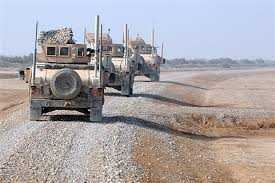
Motor transport operations form the backbone of military logistics, playing a crucial role in supporting combat and peacekeeping missions worldwide. Veterans who served in this capacity are often unsung heroes, facing unique challenges and risks that can lead to long-lasting physical and mental health issues.
Motor transport operator Veterans face several common disabilities sustained during their service. Support is available to them through the Department of Veterans Affairs (VA). The attorneys at Berry Law, many of whom are also Veterans, handle many types of disability claims. Our experienced Massachusetts VA disability benefits lawyers can help Veterans file a new claim or appeal a denied claim or undervalued disability rating.
Motor transport operators are responsible for the movement of troops, equipment, and supplies across various terrains and in diverse combat situations. From driving heavy trucks in convoy operations to operating specialized vehicles in harsh environments, these Veterans have been essential to military success in conflicts ranging from World War II to modern-day operations in Iraq and Afghanistan.
The nature of motor transport duties exposes Veterans to a variety of hazards:
Motor transport Veterans face a wide range of potential injuries and health issues stemming from their unique service conditions. From the physical strain of operating heavy vehicles to the psychological impact of serving in high-stress combat zones, these Veterans often contend with a complex array of service-connected disabilities that can significantly impact their post-military lives. Here are a few of the most common injuries affecting these Veterans:
One of the most prevalent issues among motor transport Veterans is lower back pain and related conditions. The ergonomic challenges of military vehicles, combined with the added weight of body armor and other gear, can lead to chronic back problems. Prolonged sitting, vibrations from rough terrain, and the physical demands of loading and unloading heavy equipment contribute to musculoskeletal injuries.
Veterans who have experienced IED explosions or other combat-related incidents may suffer from TBIs. These injuries can range from mild concussions to severe trauma, potentially leading to long-term cognitive, emotional, and physical impairments. Traumatic brain injury has emerged as the signature injury of the conflicts in Iraq and Afghanistan, largely due to the prevalence of IEDs used by insurgents.
The constant stress of operating in hostile environments can take a significant toll on mental health. Common conditions include:
Standing for long periods in vehicle turrets or repetitive motions associated with operating vehicle controls can lead to various lower leg issues:
Exposure to loud engine noise, explosions, and combat sounds can result in hearing impairment and persistent ringing in the ears (tinnitus).
Veterans who served in areas with poor air quality, such as those exposed to burn pits in Iraq and Afghanistan, may develop chronic respiratory issues.
While many conditions require Veterans to prove a direct service connection, some disabilities are presumed to be service-connected for certain Veterans based on their service location and time period. For motor transport Veterans, this can include:
Veterans should stay informed about updates to presumptive conditions, as the VA periodically revises its list based on emerging research and legislation. An attorney with focused experience in handling VA disability benefits claims will be up-to-date on the latest information about VA qualifications.
The PACT Act, signed into law in 2022, has significantly expanded benefits and presumptive conditions for Veterans exposed to burn pits and other toxic substances. This legislation opens new avenues for motor transport Veterans whose claims may have been previously denied or underrated.
Veterans whose claims were denied in the past should consider appealing or filing a new claim, especially if their condition is now included in the expanded list of presumptive conditions. The VA is also required to reexamine many previously denied claims related to burn pit exposure.
While the PACT Act’s impact on presumptive conditions primarily focuses on burn pit exposure and related respiratory issues, the Act also addresses other aspects that could affect motor transport Veterans:
While burn pit exposure remains a primary focus of the PACT Act, these other provisions could also benefit motor transport Veterans, depending on their specific service history and health conditions. However, the direct impact on other common injuries like musculoskeletal issues or hearing loss is limited in terms of new presumptive conditions. Veterans should talk to a lawyer for guidance on how the PACT Act might help them in the claims process.
Navigating the VA claims process can be challenging, which is why many Veterans choose to work with attorneys who focus on Veterans’ law. Attorneys who are also Veterans bring a unique perspective to the process, combining legal knowledge with a firsthand understanding of military service. These dedicated attorneys can assist with:
Motor Transport Operator Veterans have played a crucial role in military operations, often at great personal cost. The physical and mental toll of their service can result in various service-connected disabilities. Recognizing the common conditions that affect these Veterans to explore avenues for compensation helps ensure they receive the care and support they’ve earned.
Motor transport Veterans struggling with service-connected disabilities should know they are not alone. Veterans in this situation may benefit from consulting with a Veterans’ law attorney to explore their options and ensure their service is properly recognized and compensated.At Berry Law, our attorneys work with Veterans from all branches of the service who are fighting to secure the disability benefits they have earned. We work with Veterans in all 50 states and are available 24/7. Call 888-883-2483 or fill out our online contact form for a free confidential consultation.
Our monthly newsletter features about important and up-to-date veterans' law news, keeping you informed about the changes that matter.